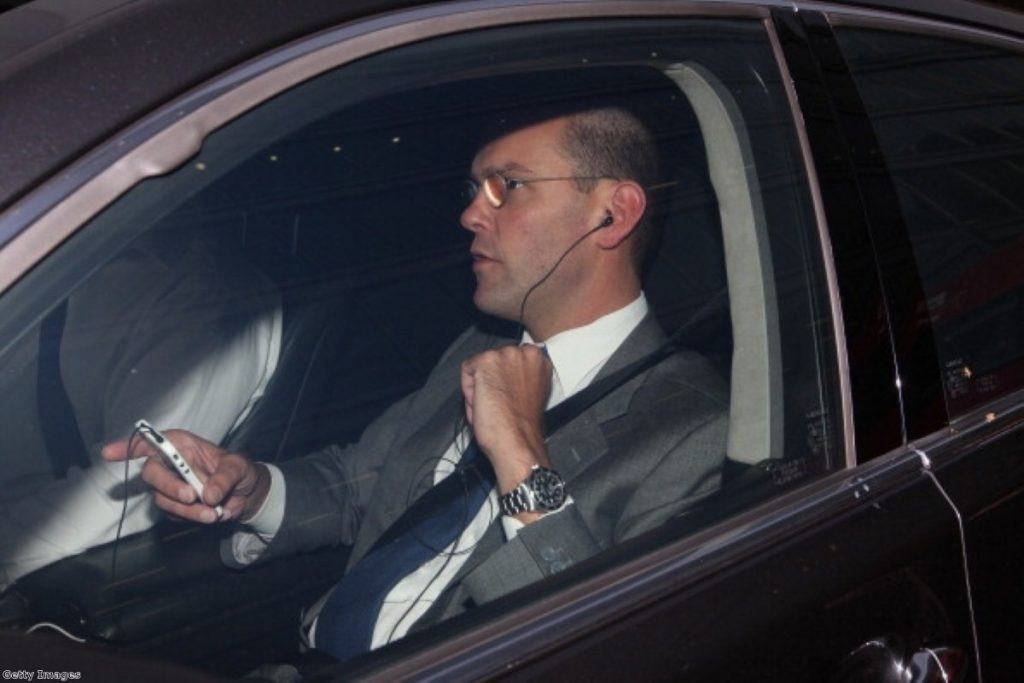Sketch: Mafia Murdoch takes out the fall guy
Perhaps James Murdoch is a member of the mafia after all. He's certainly not averse to whacking his opponents.
By Alex Stevenson Follow @alex__stevenson
At long last, after hours of queuing for this moment, the door to the committee room opened. In walked the lawyers, anonymous and solemn. Behind them came a smiling, well-dressed man, the right side of middle-aged, with glasses that close up looked horribly expensive. "Morning," he said cheerily to the MPs sitting around the horseshoe table in front of him. Silence. He sat down and tried again. "Good morning." Still nothing. This, it was clear, was going to be a tough gig.
Select committee grillings are always intimidating for those giving evidence. This was especially so for James Murdoch, who tends to find members of his family get assaulted with foam pies on this sort of occasion. Today, in addition to the MPs facing Murdoch, he also faced reinforcements on his right-hand-side in the form of 'interested' MPs. These were led by Chris Bryant, who did not tire of pulling cynical faces at every opportunity. Perhaps it was wise that Murdoch adopted the tunnel vision approach. I did not spot him, during 150 long minutes of questioning, look to his left nor his right.


Four months had passed since Rupert Murdoch and his son appeared before the Commons' culture, media and sport committee. During them, ex-News of the World editor Colin Myler and News International's lawyer Tom Crone had appeared before MPs flatly contradicting the Murdochs' evidence. Today was Murdoch's chance to rubbish their allegations.
Doing so was a delicate task. First of all he had a lot of apologising to do – initially to phone-hacking victims and then to Labour MP and committee member Tom Watson, the Murdochs' slayer-in-chief, who had been stalked by private investigators. He had to explain carefully what steps News Corps was taking to prevent it happening again. Only when these formalities were over was he able to engage in some judicious Crone-whacking. Their evidence, he said, was "confusing and muddled". Not that he would deign to make MPs' mind up for them, of course. "It's a question for this committee to judge the evidence given to it," he said solemnly. It certainly is. As he may live to regret.
It was hard to ignore the five lawyers sitting quietly behind Murdoch. They barely twitched a facial muscle during the first 20 minutes of questioning. It was only when Watson asked Murdoch whether he had been arrested (a classic piece of gamesmanship) that they offered a flicker of a smile, the first sign of life. Like those little lizards they sat utterly motionless. I was waiting for them to flick out a tongue, suddenly and without warning, and gobble Watson up. It never happened. Perhaps they feared he would stick in their throat.
News Corp's lawyers exuded that mix of confident complacency and nonchalant placidity which government lawyers are so good at. Watson invited Murdoch to consult them at one stage, as he was fed up of being fobbed off. But they weren't having any of it. They conferred together briefly, like a University Challenge team playing out the clock, before refusing to give an answer.
Murdoch had been well-schooled by these legal eagles. He was evasive wherever necessary, blocking MPs' probes without batting an eyelid. "I have no knowledge of the veracity or the substantiveness of these allegations," he said at one stage. Try that one when you stumble home late at night to be faced with a barrage of hostile claims.
They twitched and even scowled when Watson began his "yes or no?" line of questioning.
This was a sign the great Murdoch-slayer was on the right track. But, ever the politician, Watson couldn't help but finish with a piece of sheer theatre. There was no standing up, pointing the finger and shouting 'j'accuse!'. Let's not get excited. Instead he patiently developed a long lead-up to his knockout insult, as he explained why he thought News Corp was more akin to the Mafioso than an ordinary company.
"That's offensive and it's not true," Murdoch protested. The lawyers behind him wrinkled their noses. But Watson was not finished. He wrapped up quietly and assertively. It was the moment of the session as he muttered: "Mr Murdoch, you must be the first mafia boss in history who didn't know he was running a criminal enterprise." This was the verbal equivalent of being slapped with a wet fish. Or struck with a foam pie, I suppose.
Tory colleagues on the select committee groaned their disapproval – who knows what frustrations run through their head at Watson's grandstanding. "Ffff," one observed. "Oh, come on!" another muttered. Murdoch, who upon hearing Watson's jibe had withdrawn his head into his chin like a displeased tortoise, protested to committee chair John Whittingdale. "I think that's inappropriate," he said, trying to keep his voice as level as possible. It was the first time his composure had really been rocked.
The session wore on, with Murdoch quickly recovering his composure. After Watson's grandstanding I felt Philip Davies, the right-winger from Shipley, pursued the most effective line of questioning. He realised that Murdoch's chief vulnerability this autumn is with his position on the News Corp board, and that questioning his competence would rile Murdoch the most. "It all seems very cavalier to me," he said openly, as he listed the payoffs, the settlements and the lax attitude to legal advice. "I find it remarkable." So may many News Corp shareholders.
Still, it's Watson, not Davies, who is attracting all the headlines. Notoriety brings its own rewards, but also risks. He'd better watch out if a large cake is wheeled into his Westminster office. If his mafia comparison is valid, it may contain a gun-wielding gangster.









